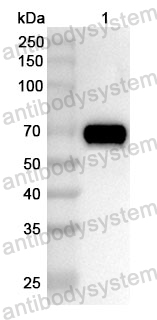Catalog No.
PHE98001
Species reactivity
Human
Host species
Rabbit
Isotype
IgG
Clonality
Polyclonal
Immunogen
E. coli - derived recombinant Human ACLY (Arg495-Ser1092).
Tested applications
ELISA: 1:4000-1:8000, IHC: 1:50-1:100, WB: 1:1000-1:4000
Target
ATP-citrate synthase, 2.3.3.8, ATP-citrate (pro-S-)-lyase, ACL, Citrate cleavage enzyme, ACLY
Purification
Purified by antigen affinity column.
Accession
P53396
Applications
ELISA, IHC, WB
Form
Liquid
Storage buffer
0.01M PBS, pH 7.4, 50% Glycerol, 0.05% Proclin 300.
Stability and Storage
Use a manual defrost freezer and avoid repeated freeze thaw cycles. Store at 2 to 8°C for frequent use. Store at -20 to -80°C for twelve months from the date of receipt.
PI3Kβ functions as a protein kinase to promote cellular protein O-GlcNAcylation and acetyl-CoA production for tumor growth., PMID:40132583
IGFBP-3 promotes cachexia-associated lipid loss by suppressing insulin-like growth factor/insulin signaling., PMID:37014770
Exploring the possible neuroprotective and antioxidant potency of lycopene against acrylamide-induced neurotoxicity in rats' brain., PMID:33711552
Pharmacological induction of mesenchymal-epithelial transition via inhibition of H2S biosynthesis and consequent suppression of ACLY activity in colon cancer cells., PMID:33484818
The IKKβ-USP30-ACLY Axis Controls Lipogenesis and Tumorigenesis., PMID:32221968
Influence of elevated protein and tannin-rich peanut skin supplementation on growth performance, blood metabolites, carcass traits and immune-related gene expression of grazing meat goats., PMID:31724236
Cell surface GRP78 promotes tumor cell histone acetylation through metabolic reprogramming: a mechanism which modulates the Warburg effect., PMID:29296215

